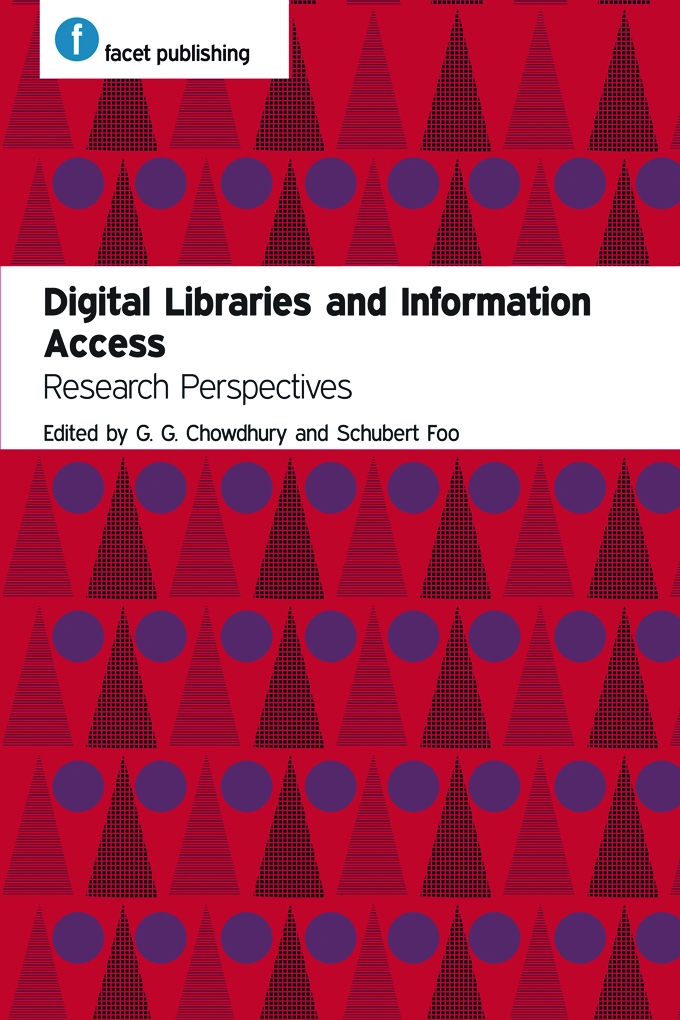Book contents
- Frontmatter
- Contents
- Foreword
- Editors and contributors
- 1 Digital libraries and information access: introduction
- 2 The design and architecture of digital libraries
- 3 Metadata and crowdsourced data for access and interaction in digital library user interfaces
- 4 Information access
- 5 Collaborative search and retrieval in digital libraries
- 6 The social element of digital libraries
- 7 Towards socially inclusive digital libraries
- 8 Users’ interactions with digital libraries
- 9 Digital libraries and scholarly information: technology, market, users and usage
- 10 Digital libraries and open access
- 11 iSTEM: integrating subject categories from multiple repositories
- 12 The usability of digital libraries
- 13 Intellectual property and digital libraries
- 14 Digital preservation: interoperability ad modum
- 15 Digital libraries and information access: research trends
- Index
- Miscellaneous Endmatter
4 - Information access
Published online by Cambridge University Press: 08 June 2018
- Frontmatter
- Contents
- Foreword
- Editors and contributors
- 1 Digital libraries and information access: introduction
- 2 The design and architecture of digital libraries
- 3 Metadata and crowdsourced data for access and interaction in digital library user interfaces
- 4 Information access
- 5 Collaborative search and retrieval in digital libraries
- 6 The social element of digital libraries
- 7 Towards socially inclusive digital libraries
- 8 Users’ interactions with digital libraries
- 9 Digital libraries and scholarly information: technology, market, users and usage
- 10 Digital libraries and open access
- 11 iSTEM: integrating subject categories from multiple repositories
- 12 The usability of digital libraries
- 13 Intellectual property and digital libraries
- 14 Digital preservation: interoperability ad modum
- 15 Digital libraries and information access: research trends
- Index
- Miscellaneous Endmatter
Summary
Introduction
As discussed in Chapter 1, information access includes all the typical information retrieval processes and activities ranging from content and data selection, and processing and indexing, to search and retrieval, and use of information and data by a designated user community in order to meet their information requirements. Research in information access (information retrieval, to be precise) began in the 1950s and the emphasis in the early days was on building automated systems for indexing so as to facilitate retrieval of documents, rather than on the needs of users. Progress in information retrieval may be summarized as follows (Agosti, 2008; Chowdhury, 2010; Ruthven and Kelly, 2011):
• Stage 1 (from 1950s to mid-1970s): The focus was on document and text retrieval using small test collections, and the application areas included catalogue, bibliographic and full-text documents. The focus was more on designing retrieval systems than on users’ needs and usability. A large number of remote online databases appeared, providing search and retrieval of abstracts and some full-text documents of scholarly information resources such as journal and conference papers.
• Stage 2 (mid-1970s to mid-1980s): The focus was still on systems rather than on users, but retrieval systems became more sophisticated and more advanced systems were built both for managing unstructured text in databases and for structured library management operations. Online Public Access Catalogues (OPACs) and more online databases appeared, facilitating remote access to information, but the systems were centralized and the focus was still on text.
• Stage 3 (mid-1980s to mid-1990s): During this period ‘the attention of information management system researchers started to move from the collection of documents towards the user and the retrieval model, with the focus on the invention of models better able to support user–system interaction’ (Agosti, 2008, 4). Alternative models, especially natural language processing and knowledge-based retrieval models, as well as hypertext and network-based models, began to appear. There was also a major shift in research from systems to users and interactions, giving rise to various information seeking and retrieval models. This was also the early phase of digital library research, where the focus was on developing robust information retrieval models and systems that were capable of processing and retrieving large quantities of digital information of different kinds – text as well as multimedia.
- Type
- Chapter
- Information
- Digital Libraries and Information AccessResearch perspectives, pp. 47 - 68Publisher: FacetPrint publication year: 2012



